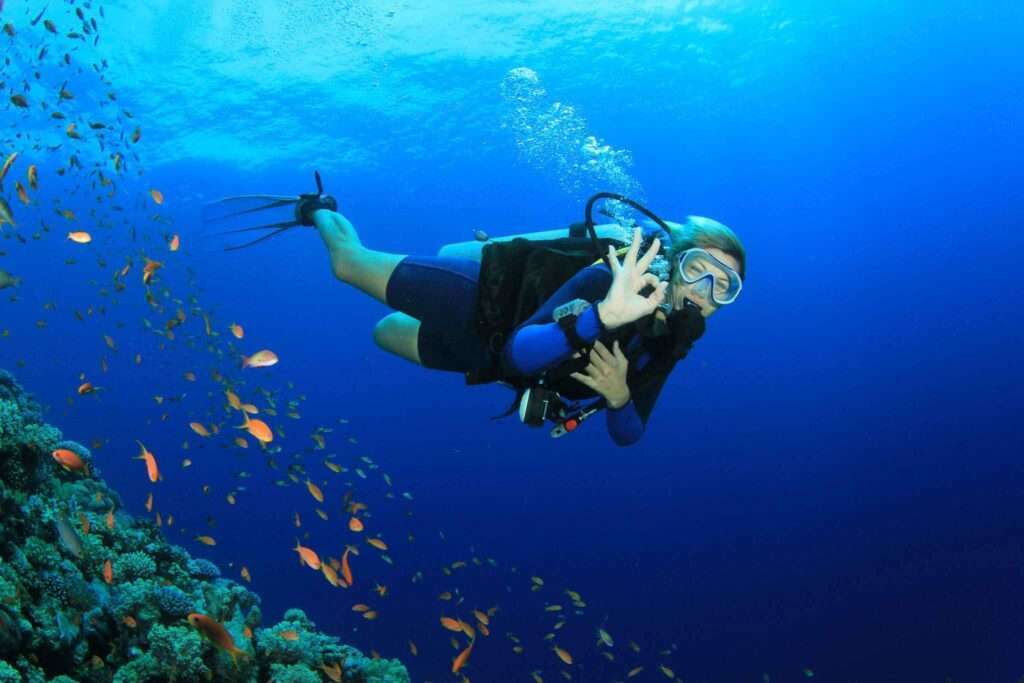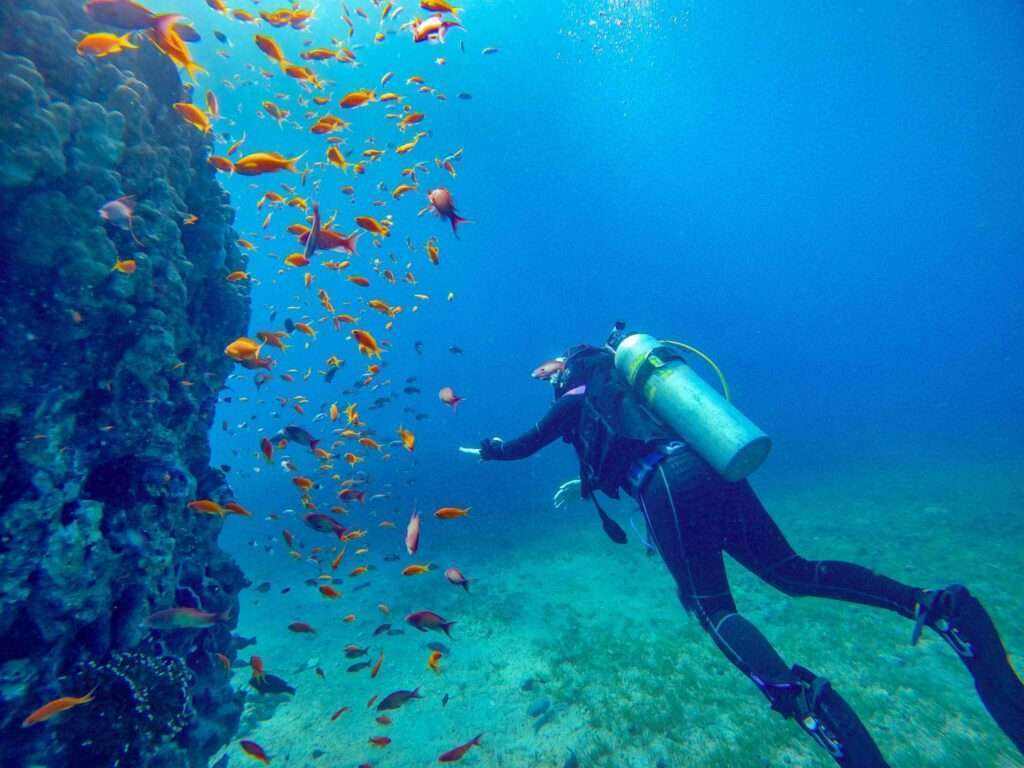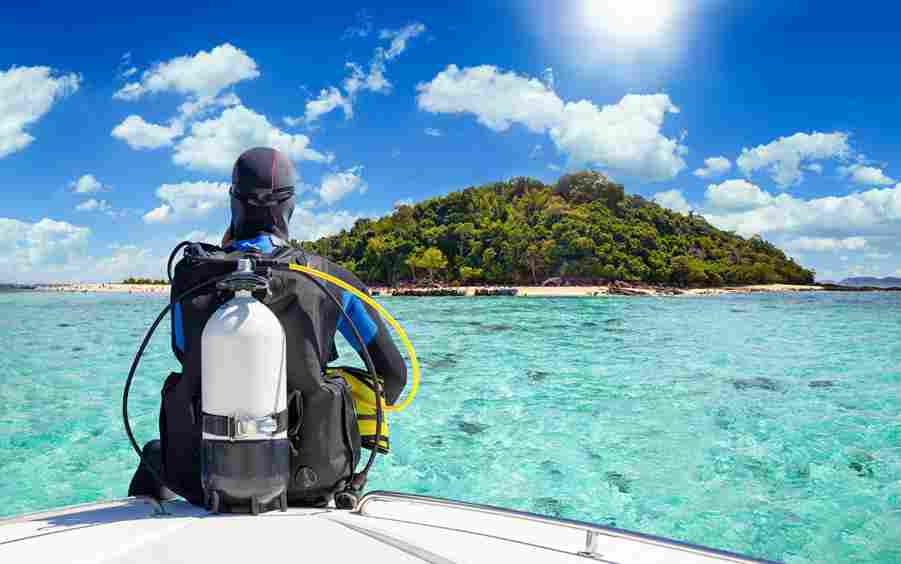Scuba diving is a popular recreational activity that allows people to explore the underwater world. Scuba diving SSI (Scuba Schools International) is one of the most popular scuba diving certification programs in the world. SSI offers a wide range of scuba diving courses for beginners and experienced divers alike.
Scuba diving SSI courses are designed to provide divers with the knowledge and skills needed to explore the underwater world safely and confidently. SSI courses cover a wide range of topics, including dive theory, equipment, and safety procedures. The courses also include practical training in a pool or open water, where divers can practice their skills under the guidance of a certified instructor. SSI courses are recognized worldwide, which means that divers can take their certification and use it to dive anywhere in the world.
Scuba diving SSI is a great way to explore the underwater world and discover the beauty of marine life. Whether you are a beginner or an experienced diver, SSI courses can help you improve your skills and become a more confident and knowledgeable diver. With SSI, you can start your scuba diving journey and experience the thrill of diving in some of the most beautiful locations in the world.
Understanding Scuba Diving SSI
History of SSI
Scuba Schools International (SSI) was founded in 1970 by Robert Clark, who was a passionate diver and instructor. SSI started as a small training agency in Colorado and has grown to become one of the largest diving organizations in the world. Today, SSI has more than 2,500 authorized dealers and dive centers in over 110 countries.
SSI Philosophy
SSI’s philosophy is to provide quality education and training to divers of all levels. SSI’s training program is designed to be flexible and personalized to meet the needs of each individual diver. The program emphasizes safety, fun, and environmental awareness, and it is based on the latest teaching methods and materials.
SSI also believes in the importance of continuing education and offers a wide range of specialty courses and advanced training programs to help divers improve their skills and knowledge. SSI’s goal is to create confident and competent divers who are passionate about exploring the underwater world and protecting it for future generations.
SSI vs Other c
SSI is one of several diving organizations that offer scuba diving certifications. Some of the other popular organizations include PADI, NAUI, and SDI. While the basic principles of diving are similar across all organizations, there are some differences in the training programs and certifications offered.
One of the main differences between SSI and other organizations is the emphasis on personalized training. SSI’s training program is designed to be flexible and tailored to the needs of each individual diver, while other organizations may follow a more rigid training structure. SSI also offers a wide range of specialty courses and advanced training programs, which may not be available through other organizations.
Another difference is the approach to continuing education. SSI encourages divers to continue their education and offers a variety of advanced training programs, while other organizations may not offer as many options for continuing education. Overall, SSI’s emphasis on personalized training and continuing education makes it an attractive option for divers who want to improve their skills and knowledge beyond the basic certification level.
Scuba Diving Fundamentals for SSI Divers

Basic Principles
Scuba diving is an exhilarating activity that requires a basic understanding of several principles. One of the most important principles is understanding the effects of pressure on the human body. As divers descend, the pressure around them increases, and they must learn how to equalize the pressure in their ears and sinuses to avoid discomfort or injury.
Another fundamental principle of scuba diving is understanding buoyancy control. Divers must learn how to control their buoyancy to maintain their position in the water column and avoid damaging delicate marine ecosystems.
Equipment Essentials for SSI Divers
Scuba diving requires specialized equipment to ensure the safety and comfort of divers. The most essential piece of equipment is the scuba tank, which provides the air supply for breathing underwater. Divers also need a regulator to control the flow of air from the tank and a buoyancy compensator to control their buoyancy.
Other essential pieces of scuba gear include a wetsuit or drysuit to keep the diver warm, fins to help the diver move through the water, and a mask to allow the diver to see underwater.
Dive Planning
Proper planning is crucial for a safe and enjoyable scuba diving experience. Before a dive, divers must plan their dive profile, including the maximum depth, bottom time, and ascent rate. They must also choose an appropriate dive site based on their skill level and the conditions of the environment.
Divers should always dive with a buddy and communicate regularly throughout the dive. They should also have a contingency plan in case of an emergency, such as running out of air or getting lost.
By understanding these fundamental principles and essential gear, and by properly planning their dives, scuba divers can enjoy a safe and rewarding underwater experience.
SSI Training Programs
Scuba Schools International (SSI) offers a range of training programs for scuba diving enthusiasts of all levels. Whether you are a beginner or an experienced diver, SSI has a program that can help you improve your skills and knowledge. Below are some of the training programs offered by SSI.
Open Water Diver
The Open Water Diver program is the foundation of scuba diving. It is designed to provide beginners with the knowledge and skills needed to dive safely in open water. The program consists of online learning modules, confined water dives, and open water dives. After completing the program, divers will be certified to dive up to 18 meters deep.
Advanced Adventurer
The Advanced Adventurer program is designed for certified divers who want to improve their skills and knowledge. It allows divers to try out various specialty programs without committing to a full program. Divers can choose from over 20 specialty programs to enhance their skills and earn their free SSI Specialty Diver, Advanced Open Water Diver, and Master Diver ratings.
Choosing the Right SSI Course
SSI offers a range of specialty courses that allow divers to explore specific areas of interest. Some of the most popular specialties include deep diving, wreck diving, night diving, and underwater photography. Specialty courses are designed to provide divers with the knowledge and skills needed to dive safely and confidently in specific environments.
Professional Level Certifications
SSI also offers professional level certifications for divers who want to turn their passion for scuba diving into a career. The professional level certifications include Divemaster, Assistant Instructor, and Open Water Instructor. These certifications are designed to provide divers with the skills and knowledge needed to teach scuba diving and lead dive trips.
Overall, SSI offers a range of training programs that cater to scuba diving enthusiasts of all levels. Whether you are a beginner or an experienced diver, SSI has a program that can help you improve your skills and knowledge.
Safety and Risk Management for SSI Divers

Scuba diving is a thrilling and adventurous activity, but it can also be dangerous if not done with proper safety measures. SSI provides a comprehensive training program that emphasizes safety, risk management, and environmental conservation.
Diving Safety Practices
SSI’s Responsible Diver Code is designed to help divers understand their personal responsibility for each dive. It helps minimize risk in diving through good judgment, common sense, respect for the underwater environment, and personal awareness in all diving activities. The code includes guidelines for proper dive planning, buddy checks, equipment checks, and emergency procedures.
In addition to the code, SSI offers a range of specialty courses that focus on diving safety practices. The Diver Stress and Rescue specialty program teaches divers the skills they need to protect themselves and others. They will learn how to identify stress, prevent accidents, and conduct rescues and provide emergency care.
Handling Emergencies
Despite the best safety practices, emergencies can still happen during a dive. SSI provides training on how to handle emergencies such as equipment failure, diver separation, and underwater injuries. The Emergency First Response course teaches divers how to provide first aid and CPR in case of an emergency.
SSI also offers a range of public safety diving programs in partnership with Dive Rescue International (DRI). The SSI Public Safety Diving and SSI Rescue Team Diver programs are designed for divers who want to become involved with public safety diving. The courses provide training on search and recovery, evidence collection, and underwater crime scene investigation.
Conservation and Diver Etiquette
SSI believes in the importance of environmental conservation and encourages divers to follow responsible diving practices. Divers are taught to respect the underwater environment and to minimize their impact on it. This includes avoiding contact with marine life, not disturbing the seabed, and properly disposing of trash.
Divers are also taught to follow proper diver etiquette. This includes being courteous to other divers, not touching or removing anything from the dive site, and not feeding marine life. By following these practices, divers can help preserve the underwater environment and ensure that it remains a healthy and vibrant ecosystem for future generations to enjoy.
Dive Theory and Physiology
Scuba diving is an exciting and rewarding activity that requires a basic understanding of dive theory and physiology. In this section, we will discuss some of the key concepts that every scuba diver should be familiar with.
Understanding Pressure and Buoyancy
One of the fundamental principles of scuba diving is understanding the relationship between pressure and buoyancy. As a diver descends into the water, the pressure increases, and the volume of air in their lungs and equipment decreases. Similarly, as a diver ascends, the pressure decreases, and the volume of air in their lungs and equipment increases. This change in volume affects buoyancy, which is the force that determines whether a diver will float or sink.
To maintain neutral buoyancy, a diver must adjust the amount of air in their buoyancy compensator device (BCD) and regulate their breathing. By inflating the BCD, a diver can increase their buoyancy and rise to the surface, while deflating the BCD will decrease their buoyancy and allow them to descend.
Breathing Techniques
Breathing is a critical aspect of scuba diving, and proper breathing techniques can help divers conserve air, reduce fatigue, and stay calm underwater. One of the most important techniques is slow, deep breathing, which helps to conserve air and reduce the risk of lung overexpansion injuries.
Another technique is equalizing, which involves equalizing the pressure in the middle ear and sinuses as a diver descends. Failure to equalize can cause discomfort, pain, and even permanent damage.
Dive Medicine
Dive medicine is the study of the effects of diving on the human body and the treatment of diving-related injuries and illnesses. Some of the most common diving-related injuries include decompression sickness, lung overexpansion injuries, and barotrauma.
To minimize the risk of injury, divers should follow established safety guidelines, such as diving within their limits, ascending slowly, and taking appropriate safety stops. Divers should also seek medical attention if they experience any symptoms of diving-related illness or injury.
In conclusion, a basic understanding of dive theory and physiology is essential for safe and enjoyable scuba diving. By following established safety guidelines and practicing proper breathing techniques, divers can minimize the risk of injury and enjoy the underwater world to the fullest.
Practical Scuba Skills for SSI Divers
Scuba diving is a thrilling and rewarding activity that requires a set of practical skills to be mastered. Here are some of the essential scuba skills that every diver should know:
Controlled Descents and Ascents
Controlling your descent and ascent is crucial for a safe and enjoyable dive. Divers must learn how to equalize their ears, control their buoyancy, and monitor their air supply while descending and ascending. SSI Scuba Skills Update provides training on these essential skills, teaching divers how to descend and ascend safely and comfortably.
Underwater Navigation
Navigating underwater can be challenging, especially in unfamiliar environments. Divers must learn how to use a compass and natural navigation techniques to navigate underwater. SSI Scuba Skills Update provides training on underwater navigation, teaching divers how to use a compass, natural navigation techniques, and how to plan and execute a dive.
Night and Limited Visibility Diving
Night and limited visibility diving require additional skills and precautions. Divers must learn how to use underwater lights, communicate with their dive buddy effectively, and maintain situational awareness in low-light conditions. SSI Scuba Skills Update provides training on night and limited visibility diving, teaching divers how to use underwater lights, communicate effectively, and maintain situational awareness in low-light conditions.
Mastering practical scuba skills is essential for every diver’s safety and enjoyment. SSI Scuba Skills Update provides training on these essential skills, helping divers to become confident and knowledgeable underwater explorers.
Exploration and Adventure
Scuba diving with SSI opens up a world of exploration and adventure. With a wide variety of dive sites and specialty programs, there’s always something new to discover. Here are just a few of the exciting options available to divers.
Wreck Diving
Wreck diving is a thrilling way to explore history and marine life. SSI offers a variety of wreck diving courses, including the Wreck Diving specialty program. This program teaches divers how to safely navigate wrecks and penetrate them if appropriate.
Deep Diving
For those seeking a greater challenge, deep diving is an excellent option. With SSI’s Deep Diving specialty program, divers can learn how to safely dive to depths of up to 40 meters (130 feet). This program covers topics such as nitrogen narcosis and decompression sickness.
Cave Diving
Cave diving is a unique and exciting way to explore underwater environments. SSI offers a variety of cave diving courses, including the Cave Diving specialty program. This program teaches divers how to safely navigate caves and use specialized equipment.
No matter what type of diving interests you, SSI has a program to help you explore and adventure safely and confidently.
Diving Destinations
Scuba diving is an exciting activity that allows divers to explore the underwater world. SSI offers training programs for divers of all levels, from beginners to professionals. With thousands of verified dive sites around the globe, SSI divers can choose from a wide variety of adventures. In this section, we will explore some of the best diving destinations for SSI divers.
Tropical Dives
Tropical diving destinations are popular among SSI divers due to their warm waters and colorful marine life. One of the most popular tropical diving destinations is the Caribbean. The Caribbean is home to some of the world’s most beautiful coral reefs and an abundance of marine life. Another popular tropical diving destination is the Maldives. The Maldives is known for its clear waters and diverse marine life, including whale sharks, manta rays, and sea turtles.
Cold Water Dives
Cold water diving destinations offer a unique diving experience for SSI divers. One of the most popular cold water diving destinations is Alaska. Alaska offers divers the opportunity to dive with giant octopus and other cold water marine life. Another popular cold water diving destination is Canada. Canada offers divers the chance to explore wrecks and kelp forests.
Altitude Diving
Altitude diving destinations offer divers the opportunity to explore unique diving environments. One of the most popular altitude diving destinations is Lake Tahoe. Lake Tahoe is located at an altitude of 6,225 feet and offers divers the opportunity to explore underwater forests and rock formations. Another popular altitude diving destination is Lake Titicaca. Lake Titicaca is located at an altitude of 12,500 feet and is known for its clear waters and unique marine life.
SSI divers have a wide variety of diving destinations to choose from. Whether you prefer tropical dives, cold water dives, or altitude dives, there is a diving destination that will suit your preferences.
Equipment and Maintenance

Selecting Scuba Gear
When it comes to scuba diving, having the right gear is essential for a safe and enjoyable experience. SSI offers a range of courses, including the Equipment Techniques specialty, to help divers learn how to choose and maintain their gear.
Before selecting scuba gear, it’s important to consider factors such as water temperature, visibility, and depth. A wetsuit, for example, is necessary to keep the diver warm in colder water. Additionally, the type of fins, mask, and regulator can vary based on the individual’s preferences and the conditions of the dive site.
Maintenance and Storage
Proper maintenance and storage of scuba gear is crucial to ensure its longevity and performance. The SSI Equipment Techniques program teaches divers how to properly clean and maintain their gear, including regulators, BCDs, and tanks.
After each dive, gear should be rinsed with fresh water and allowed to air dry in a cool, shaded area. It’s also important to store gear in a dry, ventilated space to prevent mildew and corrosion.
Customizing Equipment
Divers may choose to customize their gear based on their individual needs and preferences. For example, some divers may prefer a weight-integrated BCD, while others may prefer a backplate and wing setup.
Customization can also include adding accessories such as dive computers, underwater cameras, and dive lights. However, it’s important to ensure that any added gear is properly secured and does not interfere with the diver’s movement or buoyancy.
Overall, proper selection, maintenance, and customization of scuba gear is essential for a safe and enjoyable diving experience.
Community and Continuing Education
Scuba diving is not just a sport, but a community of like-minded individuals who share a passion for exploring the underwater world. Joining a diving club is a great way to meet new people, learn from experienced divers, and participate in group dives. Diving clubs often organize trips to dive sites around the world, providing opportunities for divers to explore new environments and expand their skills.
Joining a Diving Club
SSI offers a variety of resources to help divers find and join a local diving club. These clubs are typically run by experienced divers who are passionate about sharing their knowledge and love of diving with others. Joining a club is a great way to meet new people, learn from experienced divers, and participate in group dives. Many clubs also offer training and certification programs, as well as equipment rental and repair services.
Continuing Education Opportunities
SSI offers a range of continuing education opportunities for divers who want to expand their skills and knowledge. These programs include specialties such as wreck diving, night diving, and underwater photography, as well as advanced courses in rescue diving, dive leadership, and technical diving. SSI also offers instructor training programs for divers who want to become certified to teach others.
Citizen Science Projects
Divers can also get involved in citizen science projects that help to monitor and protect the marine environment. These projects include coral reef monitoring, marine debris cleanup, and scientific research expeditions. By participating in these projects, divers can make a positive impact on the environment while also learning more about the underwater world.
Frequently Asked Questions
What are the different SSI certification levels for scuba diving?
SSI offers a range of certification levels for scuba diving, from beginner to professional levels. The most popular certification levels include Open Water Diver, Advanced Open Water Diver, and Master Diver. Other certification levels include Dive Guide, Dive Control Specialist, and Instructor. Each certification level has its own set of requirements and training programs.
How does SSI certification compare to PADI?
Both SSI and PADI are recognized certification agencies for scuba diving. SSI is known for its flexible training programs, while PADI is known for its standardized training programs. SSI offers a range of courses that cater to different learning styles and preferences, while PADI has a more structured approach to training. Ultimately, the choice between SSI and PADI comes down to personal preference.
What is the maximum depth limit for an SSI Open Water Diver?
The maximum depth limit for an SSI Open Water Diver is 18 meters (60 feet). This is the standard depth limit for recreational scuba diving. However, SSI also offers advanced training programs for divers who wish to dive deeper.
Can SSI certifications be used globally for scuba diving?
Yes, SSI certifications are recognized worldwide for scuba diving. SSI has a global network of dive centers and resorts that accept SSI certifications. However, it is always recommended to check with the dive center or resort beforehand to ensure that they accept SSI certifications.
What are the prerequisites for enrolling in an SSI Advanced Open Water course?
To enroll in an SSI Advanced Open Water course, a diver must have an SSI Open Water Diver certification or an equivalent certification from another agency. The diver must also be at least 15 years old and have completed at least four open water dives.
How do I log my dives with SSI’s dive log book?
SSI offers a digital dive log book that can be accessed through the MySSI app or the SSI website. Divers can log their dives, track their certifications, and share their achievements with others. The digital dive log book is free for all SSI certified divers.
